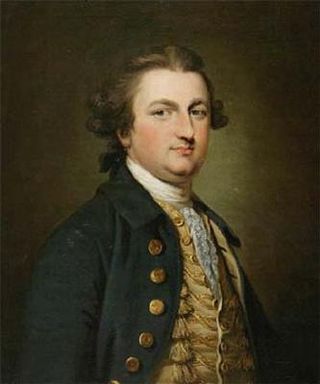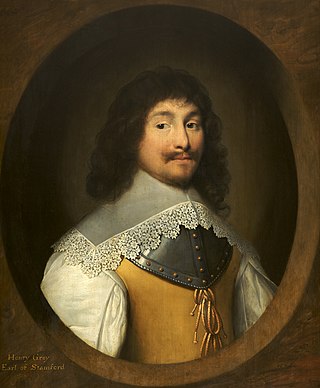Related Research Articles

Earl of Derby is a title in the Peerage of England. The title was first adopted by Robert de Ferrers, 1st Earl of Derby, under a creation of 1139. It continued with the Ferrers family until the 6th Earl forfeited his property toward the end of the reign of Henry III and died in 1279. Most of the Ferrers property and the Derby title were then held by the family of Henry III. The title merged in the Crown upon Henry IV's accession to the throne in 1399.

Mervyn Tuchet, 4th Earl of Castlehaven was the third son of Mervyn Tuchet, 2nd Earl of Castlehaven, and his first wife, Elizabeth Barnham. He succeeded his brother James Tuchet as Earl of Castlehaven on 11 October 1684. He also held the subsidiary titles 14th Baron Audley and 2nd Baron Audley of Hely.

Baron Stafford, referring to the town of Stafford, is a title that has been created several times in the Peerage of England. In the 14th century, the barons of the first creation were made earls. Those of the fifth creation, in the 17th century, became first viscounts and then earls. Since 1913, the title has been held by the Fitzherbert family.

Earl of Plymouth is a title that has been created three times: twice in the Peerage of England and once in the Peerage of the United Kingdom.

Earl of Strafford is a title that has been created three times in English and British history.

Edward Somerset, 4th Earl of Worcester, KG, Earl Marshal was an English aristocrat. He was an important advisor to King James I, serving as Lord Privy Seal.

Henry Somerset, 5th Duke of Beaufort was an English courtier and politician. Styled the Marquess of Worcester from 1746, at his father's death on 28 October 1756, he succeeded him as 5th Duke of Beaufort, 7th Marquess of Worcester, 11th Earl of Worcester, and 13th Baron Herbert.

Henry Grey, 1st Earl of Stamford, known as the Lord Grey of Groby from 1614 to 1628, was an English nobleman and military leader. He was the eldest son of Sir John Grey and Elizabeth Nevill. His mother was probably a daughter of Edward Nevill, 8th Baron Bergavenny and his wife Rachel Lennard.

George Manners, 11th Baron de Ros of Helmsley was an English peer.

George Montagu, Duke of Montagu KG, PC, FRS styled Lord Brudenell until 1732 and known as the Earl of Cardigan between 1732 and 1766, was a British peer.
Thomas Hickman-Windsor, 1st Earl of Plymouth, PC, was the son of Dixie Hickman and his wife Elizabeth Windsor, sister and heiress of Thomas Windsor, 6th Baron Windsor. He assumed the additional surname of Windsor and succeeded to the Windsor family's estate around Hewell Grange near Redditch in 1645. The same year he distinguished himself in the Battle of Naseby. Hickman-Windsor impressed King Charles I by relieving his garrison at High Ercall.
Andrew Windsor, 1st Baron WindsorKB (1467–1543), was a Member of Parliament, English peer, and Keeper of the Wardrobe, knight banneret and military commander.

Thomas Dacre, 2nd Baron Dacre of Gilsland, KG was the son of Humphrey Dacre, 1st Baron Dacre of Gilsland and Mabel Parr, daughter of Sir Thomas Parr of Kendal by his wife, Alice Tunstall. Mabel was the first of the Parr family to marry into the peerage but she was surpassed by her great niece, Catherine Parr, who became the sixth and final wife of Henry VIII.

John (III) de Mowbray, 4th Baron Mowbray was an English peer. He was slain near Constantinople while en route to the Holy Land.

Elizabeth Somerset, Countess of Worcester was a Scottish-born noblewoman. She was the daughter of Francis Hastings, 2nd Earl of Huntingdon, and Catherine Pole.

Dorothy Bray, Baroness Chandos was an English noblewoman, who served as a Maid of Honour to three queens consort of King Henry VIII of England; Anne of Cleves, Catherine Howard, and Catherine Parr. From 1541 to 1543, she had an affair with the latter's married brother, William Parr, 1st Marquess of Northampton.
Other Lewis Windsor, 4th Earl of Plymouth DL was a British peer, styled Lord Windsor until 1732.

John Baron Dutton, 2nd Baron Sherborne, was a British peer.
Colonel Henry Sandys, 5th Baron Sandys, was an English nobleman and Cavalier officer in the English Civil War.
Other Windsor, 3rd Earl of Plymouth was an English peer and landowner, a member of the House of Lords from 1728 until his death.
References
- 1 2 3 Burke, J. & J. B. (1846). A General and Heraldic Dictionary of the Peerages of England, Ireland, & Scotland (3rd ed.). pp. 463–464. Retrieved 16 October 2019.
- 1 2 3 Banks, T. C. (1808). The Dormant and Extinct Baronage of England. Vol. 2. p. 456. Retrieved 16 October 2019.